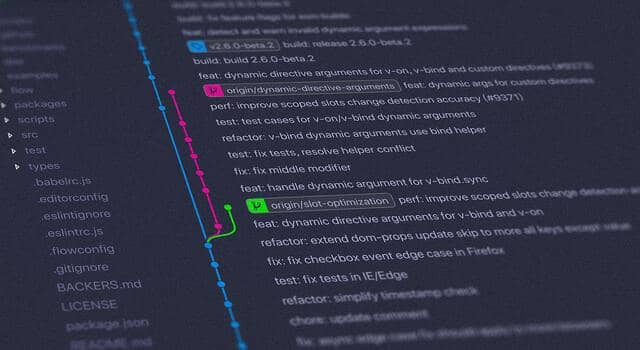The ability to code is not reserved for software engineers and computer scientists alone. Today, proper knowledge of algorithms and fluency in programming languages are in-demand skills in the workplace. Unfortunately, learning a programming language can feel like learning a new natural language from scratch. The learning process can feel much easier and progress much faster, however, when keeping the following coding tips in mind.
What Is Coding?
Coding is the process of writing instructions that help a computer ‘understand’ what to do. This is done using programming languages, which are syntaxes and rules that direct a computer toward the desired results. Coding can be used to create websites and apps, automate tasks, develop machine learning models, and more – all made possible by algorithms written in code. In short, coding allows us to interact with digital devices and machines in exciting, innovative ways.
What Is Coding Used For?
Coding is used for creating software, websites, and apps. It helps people to develop ideas and strategies faster by automating certain processes. Coding can be used to create applications, websites, and systems that can interact with databases, the internet, and other technologies. This allows developers and businesses to create powerful programs or products in a very short amount of time. With coding skills becoming more important in today’s technology-driven world, it is critical for professionals to have some familiarity with coding in order to stay up-to-date on trends and techniques.
Is Coding Hard To Learn?
Coding can be hard to learn initially, but with enough dedication and persistence, the skills needed can be acquired. To start, it’s helpful to have practice exercises and tutorials available online or through an app. Practicing frequently will help cement your knowledge of coding basics and eventually progress onto more complex topics. Additionally, having an experienced mentor or a community of other coders to ask questions and receive guidance can also be beneficial in speeding up the learning process.
How Long Does It Take To Learn Coding?
The amount of time it takes to learn to code depends on a few factors such as the type of coding language you are learning, the complexity of the programming language, and the amount of dedication you have to practice and reinforce your skills. Generally speaking, it typically takes anywhere from 3 months to 6 months to fully understand coding basics with continued effort, while gaining more advanced computer programming knowledge can take up to 12 months or even longer depending upon experience level and expertise.
Learning How To Code In 5 Simple Steps
Are you interested in learning the skills you need to develop software applications and other computer programs? Knowing how to code in a programming language can be incredibly useful, especially in the modern-day job market. If you’re ready to learn how to code but don’t know where to begin, here are five easy steps that will help get you set up:
Start Simple: Choose Programming Languages That Are Easy to Learn

Before diving right into coding, it’s important to choose the right programming languages that are relatively simple to understand and can easily make changes over time.
A lot of potential programmers scare themselves out of learning by being overly ambitious at first or obsessively comparing themselves to those who have been in the field for years. When learning English, the first step is to learn the alphabet – the very basics. The same fundamental idea applies to learning a programming language. It’s important to begin somewhere simple; for instance, a high-level programming language, whose syntax is quite similar to the English language, is a great option for beginners. Python is a great place for beginners because it has a relaxed syntax and structure, making it easier for you to read and write code. JavaScript is also another popular choice – its friendly syntax makes coding projects enjoyable and accessible for anyone who wants to learn it.
Examples of this type of language include C#, Python, and Java. Most high school curriculum and introductory college courses teach these languages. Be sure to take advantage of these learning opportunities early on.
Find Good Resources

A great way to start learning how to code is by looking up resources online like tutorials, video courses, and articles written by experienced developers or coders. This should give you an overview of what types of concepts are involved in various coding languages as well as strategies for implementing them correctly in practice. Most of these resources can be found for free on websites such as Youtube and Medium – take advantage of them!
Additionally, online courses or coding bootcamps can all be easily found online and are great for anyone just starting out. Online courses are great for those who need a structured learning environment and provide great resources and community. With the help of these resources, learning a new programming language can easily become a walk in the park. Some people are visual learners, some auditory, and others kinesthetic. Finding the type of media or learning material that works for your specific learning needs will help you get the most out of your experience and it can save a ton of time and effort.
Moreover, universities are increasingly making their programming courses available online for free or at a small price. Having access to these quality courses and their assignments, which are often peer-reviewed, can accelerate learning and facilitate the understanding and fixing of errors.
Practice Learning How To Coding Along With Tutorials

Once you have your chosen language down pat, find some tutorials online or through textbooks that allow you to practice writing code while seeing a few examples along the way. Doing this step-by-step instead of simply reading theory will ensure that you gain practical experience with the language before working on live projects on your own.
Although allocating an entire single day per week to programming may seem like an enticing idea, planning shorter sessions over the span of several days is a much better one. Studies have shown that cramming is only useful for short-term memory retention. Spacing out study sessions and revisiting old topics, on the other hand, allows for information to remain much longer in memory. Further split sessions into segments with tasks that maintain focus on setting learning goals.
Preferably, start out with a review of the last session’s concepts. Afterward, move on to this session’s topics. And finally, conclude with some practice exercises. Learn the syntax of a language well and pay extra attention to the different types of errors, conditionals, and loops available for a specific language. Consistency is key and it’s important to continuously practice coding. Coding is a life skill that may be used for several projects and lines of work; therefore, it’s important to firmly cement its knowledge in mind by studying coding over shorter periods.
Join an Online Community or Meetup Group
These communities are filled with experienced coders who use their knowledge to teach others how they do things themselves – something which many students find extremely helpful when starting out their journey into learning how to code! Make sure that once joining one of these groups; ask lots of questions so that you can pick up tips from those around you more quickly. Plus, making connections with professionals will be invaluable as your career develops after graduation!
Take On Small Projects
This may require more research than if taking on small tutorials but picking up some real small digital development projects gives large returns in terms of gaining actual coding experience – apps such as Instagram clones or data analysis projects (in Python). Even if it’s just something simple like building a website from scratch, this shows initiative towards developing practical skills that employers highly value when looking for new hires for digital roles within their company teams!
Coding Tips To Help You On Your Journey To Learn To Code
Coding Tip 1: It’s Not a Competition

Measuring personal growth and not comparing it to that of others is of the utmost importance while learning. Many fully-fledged programmers post their work online as complex snippets or impressive open-source software. While the beginner can only squeeze out less than a hundred lines’ worth of code performing basic algorithms. Senior programmers’ posts are often products of long-term work and years of learning. The completed work does not show the bumps and hiccups the programmer may have run into while learning, developing, and debugging.
Unfortunately, demotivation from comparing the personal effort to that of a veteran programmer is not difficult to run into. Remember that everyone has to start somewhere. These programmers were not born knowing how to think computationally or having full command of the languages they use.
Check out these code-sharing resources where you’ll be able to share projects you’re working on. You could get feedback on your progress and even receive help if you’re running into any issues.
Coding Tip 2: IDEs are Friends

Arguably the most important thing a programmer can do while learning a new language is to have an integrated development environment (IDE) for the programming language up and running during study sessions. This is to test newer concepts as they come up; regularly attempt to solve practice questions instead of simply skipping over their solutions; and perhaps even begin writing a first program. There are many open-source and free-to-use IDEs available; some are online and don’t even require installation!
Make a habit of using these IDEs to properly apply the concepts learned during study sessions. Many of them have an auto-complete feature for keywords, but it helps when starting out to turn this feature off in order to practice recalling the specific programming language’s syntax.
Conclusion
Coding is a powerful skill to have across most professions and can most definitely give your resume the boost needed for an instant hire. Learning how to code might seem daunting and overwhelming at first. However, by following these coding steps and tips on learning a new programming language and putting in the required effort, learners will quickly find it difficult to keep track of how many new languages they’ve become fluent in.


